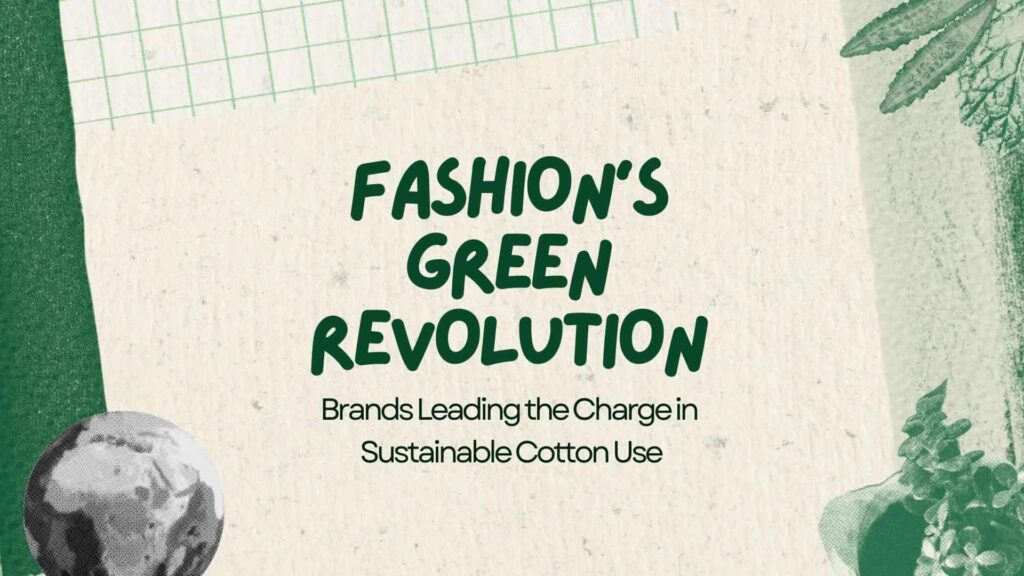Introduction
Sustainability is no longer just a trend in fashion; it’s a necessity. As consumers become more eco-conscious, brands rethink their sourcing and manufacturing methods. In fact, sustainable cotton use has become a core focus in this shift. This change transforms fashion and helps reduce its environmental footprint. The cotton fiber plays a critical role in this movement, as it remains one of the most widely used materials in the cotton textile industry. Thus, embracing sustainability is essential for both the fashion industry’s future and the planet’s health. Let’s explore how leading brands drive this change.
Traditional cotton farming uses large amounts of water, pesticides, and synthetic fertilizers. As a result, it harms the soil, pollutes water, and contributes to climate change. In contrast, sustainable cotton farming focuses on eco-friendly methods such as organic cultivation, better soil management, and water conservation. Switching to these practices significantly reduces cotton production’s environmental impact.
Brands that use sustainable cotton help to:
Reduce Environmental Footprints By minimizing chemical use and conserving water.
Support Ethical Practices By ensuring fair wages and improving working conditions.
Meet Consumer Demand By offering products that align with eco-conscious values.
Leading Brands Championing Sustainable Cotton
1. Patagonia
Patagonia stands out for its sustainability efforts. For instance, it uses only organic cotton, avoiding harmful pesticides and fertilizers. Additionally, the brand supports regenerative farming practices that improve soil health and capture carbon.
2. Levi’s
Levi’s emphasizes water conservation and ethical practices. For example, its Water<Less® program significantly reduces water usage in cotton production. The company also sources cotton fiber from the Better Cotton Initiative (BCI), which ensures ethical farming practices.
3. H&M Conscious Collection
H&M’s Conscious Collection demonstrates the brand’s commitment to sustainability. This line features products made from organic and recycled cotton, showing that eco-friendly fashion can be both stylish and affordable. Moreover, the company guarantees sustainable cotton sourcing, which aligns with its broader sustainability goals.
4. Adidas
Adidas incorporates sustainable cotton into its products through the Better Cotton Initiative. As a result, the brand proves that high-performance wear can also be eco-friendly and responsibly sourced.
5. Eileen Fisher
Eileen Fisher has long prioritized sustainability. The brand uses organic cotton and supports circular fashion practices. Additionally, it encourages recycling and reusing garments, helping to minimize waste in the fashion industry.
Challenges and Opportunities in Scaling Sustainable Cotton
Scaling the use of sustainable cotton is not without its challenges. Limited supply, higher costs, and the need for greater transparency in supply chains remain obstacles. Nevertheless, these challenges create opportunities for innovation.
Technologies such as blockchain for traceability, increased investment in sustainable farming, and partnerships like the Sustainable Cotton Challenge help expand the use of sustainable cotton. Thus, the industry continues to adopt these sustainable practices, and progress is steadily being made.
How Consumers Can Drive the Change
Consumers play a key role in accelerating the adoption of sustainable cotton. By choosing brands that prioritize sustainability, consumers can help steer the industry toward greener practices.
Here’s how consumers can contribute:
Choose products made from organic or recycled cotton.
Look for certifications such as GOTS (Global Organic Textile Standard) or BCI to ensure sustainability.
Spread awareness about the environmental impact of cotton farming and sustainable fashion.
A Greener Future for Fashion
Sustainable cotton benefits everyone—from farmers to fashion lovers. By embracing sustainable cotton, brands show that style and sustainability can go hand in hand.
Furthermore, as more companies adopt sustainable practices, the fashion industry enters a green revolution. This revolution prioritizes ethical practices, environmental stewardship, and innovation. Therefore, the future of fashion is undoubtedly sustainable
The journey toward sustainability in fashion requires collaboration from brands, suppliers, and consumers. By embracing sustainable cotton, leading brands set a strong example. Although challenges persist, growing momentum signals a brighter, more sustainable future for fashion.
Moreover, the benefits of using organic cotton fiber in sustainable textiles include reduced pesticide use, healthier soil, and a smaller carbon footprint. These advantages help create a more eco-friendly, socially responsible industry. Ultimately, consumers shape the future by supporting brands committed to sustainability. Together, we can ensure fashion leaves a positive impact on both people and the planet.

